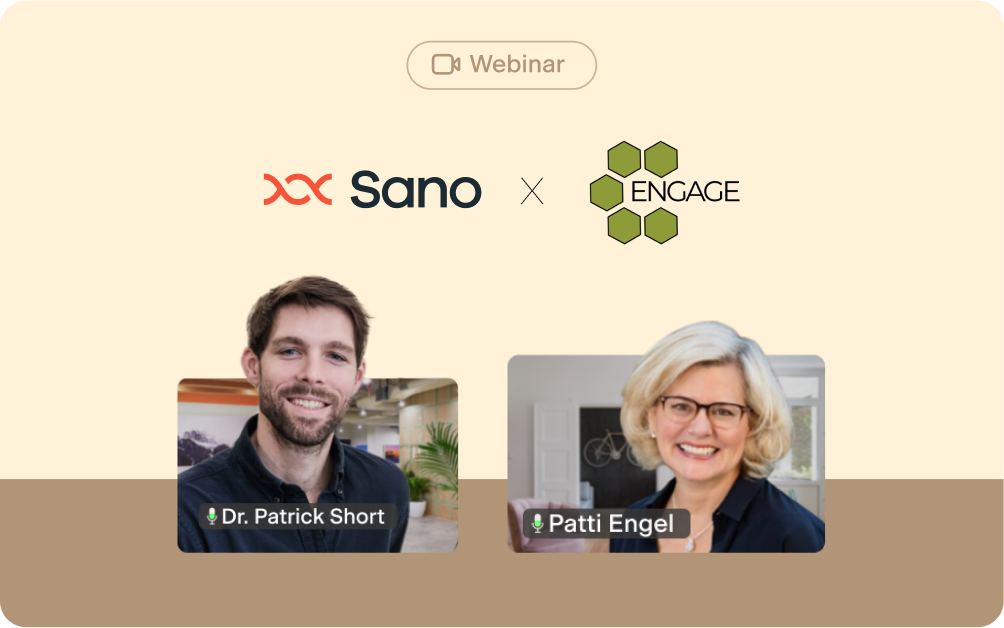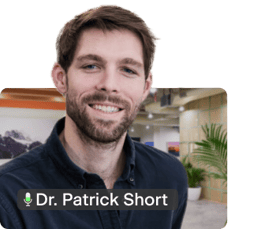Webinar recap: How can applying a "rare disease mindset" accelerate and de-risk precision medicine trials?

In a this webinar, Patrick Short, CEO and co-founder of Sano Genetics, and Patti Engel, CEO of Engage Health, discussed how applying a “rare disease mindset” can accelerate and de-risk precision medicine research. The discussion focused on a case study of a precision medicine trial in movement disorders, particularly Parkinson's disease, where they successfully identified patients with rare genetic variants of interest.
About the speakers
Dr. Patrick Short
Dr. Patrick Short, PhD is the Co-founder and CEO of Sano Genetics. Sano’s platform helps clinical development teams to move 10x faster at 5x lower cost by automating entire workflows for protocols, consent, prescreening, genetic testing, and matchmaking with trial sites.
Patti Engel
Patti Engel is the President and CEO of Engage Health, a health research firm that specialises in market research, patient finding, and trial enabling work. With over 25 years of experience in the rare disease space, Patti has been an innovator in taking proactive approaches towards clinical trial patient recruitment for precision medicine research.
You can watch the webinar below or here; we've also included a brief summary for easy reference.
Highlights from the webinar
What are the challenges involved in running precision medicine research?
Patient identification is one of the biggest challenges in precision medicine research. Patti emphasized that it is not enough to just recruit patients with a certain disease, but it is also important to recruit patients who are informed on their genetics through genetic testing.
For example, in the case study discussed in the webinar, patient identification was conducted by Sano Genetics and Engage through an omni-channel approach, including social media, patient organizations, and healthcare providers. In addition, hands-on support through medical science liaisons (MSLs) was provided, which helped patients navigate the testing process and provided counseling support.
The program was not just focused on finding patients with rare genetic variants of interest, but also on enabling trials. By identifying patients early on, Sano and Engage were able to fill the natural history study that the client was planning before filing with the IRB. This allowed them to have patients already identified to enable not only that trial but also other investigational trials as they go forward.
What can we learn from this case study?
There are several lessons to be learned from this case study. One of the most important lessons is that every patient population is different, and it is important to understand the audience and leverage a variety of approaches so that no one falls through the cracks. Taking a decentralized approach to patient identification was critical, as it allowed engagement with patients who would have otherwise been lost. Additionally, the use of concierge services ensured greater participation compared to more passive approaches.
Another key insight from the program was the importance of engaging with patient advocacy groups. By involving patient advocacy groups later in the program, Sano and Engage had a little bit of test data under their belts, and were a lot more comfortable with what they were sharing with their membership.
Finally, there’s a key opportunity for clinical stage companies to engage with people in the community and establish relationships with healthcare providers who will eventually be their customers. This can be a valuable takeaway for companies without a commercial group or sales organisation.
Summary
Applying a “rare disease mindset” can accelerate and de-risk precision medicine trials. In the case study discussed in this webinar, by taking a proactive approach to patient identification, trial enabling, and engaging with patient advocacy groups, Sano Genetics and Engage Health were able to successfully identify patients with rare genetic variants of interest and fill a natural history study. Of critical importance was understanding the audience, taking a decentralized approach, and using concierge services to ensure greater participation. These insights can be valuable for future precision medicine research, particularly in rare diseases.


